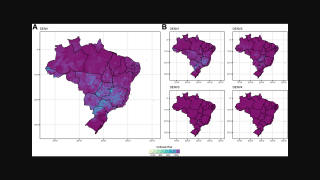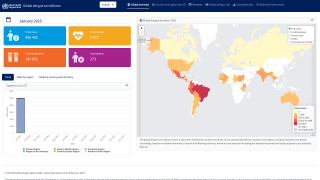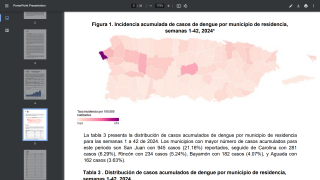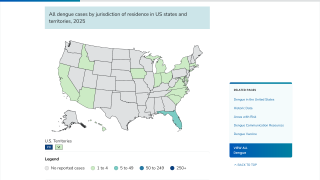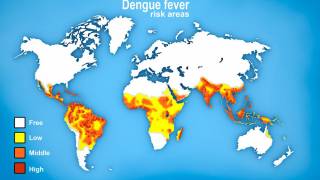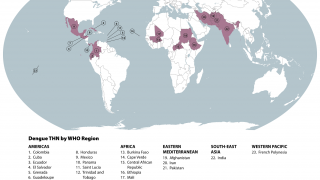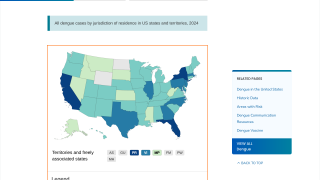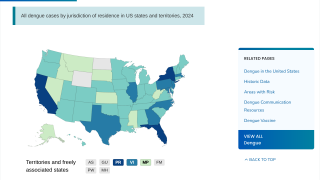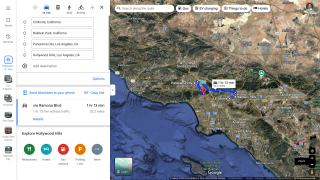Dengue Cases Confirmed in France and Spain

New cases of dengue fever have been reported in both France and Spain during September 2019.
But, the probability of further local sustained transmission of dengue remains very low, said the European Center for Disease Prevention and Control (ECDC) on October 1, 2019.
The ECDC says ‘Ae. albopictus mosquitoes are mainly driven by the survival of adults and the development of larvae and rainfall in the presence of breeding sites.’
And, ‘the environmental conditions will become progressively less suitable for mosquito transmission over the balance of the Autumn Season in both France and Spain.’
Which is good news.
But, based on previous observations, ‘a large volume of travel-associated Dengue cases may be reported from travelers returning from endemic tropical and subtropical countries favoring the introduction of dengue viruses.’
Dengue is a mosquito-borne disease caused by viruses of the Flaviviridae family. There are 4 antigenically distinct serotypes of dengue viruses (DENV 1–4).
>>Dengue Tests Available Ulta Labs<<
The mosquito Ae. albopictus is a competent vector for all dengue virus serotypes.
There is no specific treatment for dengue or severe dengue, but early detection and access to proper medical care lowers fatality rates below 1 percent, reported the ECDC.
The new ECDC summary is excerpted below:
Spain
- Up until 2018, only imported dengue cases were detected in Spain, mainly in people returning from Latin America and Asia-Pacific. In 2018, six autochthonous dengue cases were reported from Spain.
- On September 16, 2019, the Catalonian Public Health Agency confirmed an autochthonous case of dengue in a resident of Barcelonès county in Catalonia, Spain.
- The case had the onset of symptoms on September 6, 2019, with no travel history outside of Spain during the past 2 years. To date, epidemiological investigations have not identified the primary travel-associated case.
- Epidemiological investigations in Catalonia are ongoing, and further cases may be detected. According to national authorities, control measures are being implemented.
- All confirmed dengue cases were serotype 1 (DENV-1).
- According to data retrieved from RENAVE, the Spanish National Surveillance Network, on September 6, 2019, Spain reported 580 confirmed imported cases of dengue between 2015 and 2018, with 149 cases in 2018.
- Probable country of infection: 16.5% cases reported exposure in Thailand, 12.75% were exposed in Paraguay, 9.9% in Indonesia, and 7% in India.
France
- In summary, 5 autochthonous dengue cases, all living within a 100-meter radius, were identified by September 26, 2019.
- In addition, an imported case was diagnosed – probably the primary - on September 20, 2019. The case did not report any recent travel history outside of mainland France.
- The door-to-door active case finding was implemented around the home of the autochthonous case on September 19.
- Four additional cases of dengue in the direct vicinity were identified.
- In addition, the regional public health agency of Auvergne-Rhône-Alpes reported a locally acquired probable dengue case in a resident of Caluire-et-Cuire − a suburban area of the city of Lyon − in the Rhône department. The case did not report any recent travel outside of mainland France.
- The French NRC confirmed both the autochthonous case and the imported case with positive PCR for DENV-1.
- According to data retrieved from The European Surveillance System (TESSy) on September 6, 2019, France reported 759 confirmed imported dengue cases between 2015 and 2018, with 289 in 2018.
- Countries where dengue cases originated include 17% from Thailand, 10% from Indonesia, and 8% from French Polynesia.
- According to the World Health Organization (WHO) authorities in May 2019, France’s Réunion Island reported a significant increase in Dengue virus cases during 2019. From January through April 30, 2019, over 7,700 confirmed cases have been reported by the WHO. Overall, 14 deaths related to dengue infections have been reported since 2018.
‘These events should be considered as independent because epidemiological investigations could not identify any epidemiological links between them,’ said the ECDC in this new report.
But, ‘based on ECDC’s epidemiological assessment, the risk that international visitors to dengue-endemic areas may become infected and subsequently introduce the virus upon returning and initiate further local transmission in their country of residence cannot be excluded.’
On May 1, 2019, Dengvaxia became the first vaccine approved in the USA for the prevention of dengue disease in people ages 9 through 16 who have laboratory-confirmed previous dengue infection and live in endemic areas caused by all dengue virus serotypes.
The Dengvaxia vaccine has already been approved in 19 countries and the European Union.
In the USA, the Florida Department of Health in Miami-Dade County (DOH-Miami-Dade) issued a mosquito-borne illness alert during September 2019, after a 4th locally-acquired dengue case was confirmed.
According to a DOH-Miami-Dade news release on September 13, 2019, these 4 dengue cases ‘don't appear to be related.’
UPDATE: On October 9, 2019, the US Centers for Disease Control and Prevention issued a Level 1 Travel Alert regarding dengue fever in the Mediterranean Region.
Dengue Vaccine information published by Vax-Before-Travel
Our Trust Standards: Medical Advisory Committee




